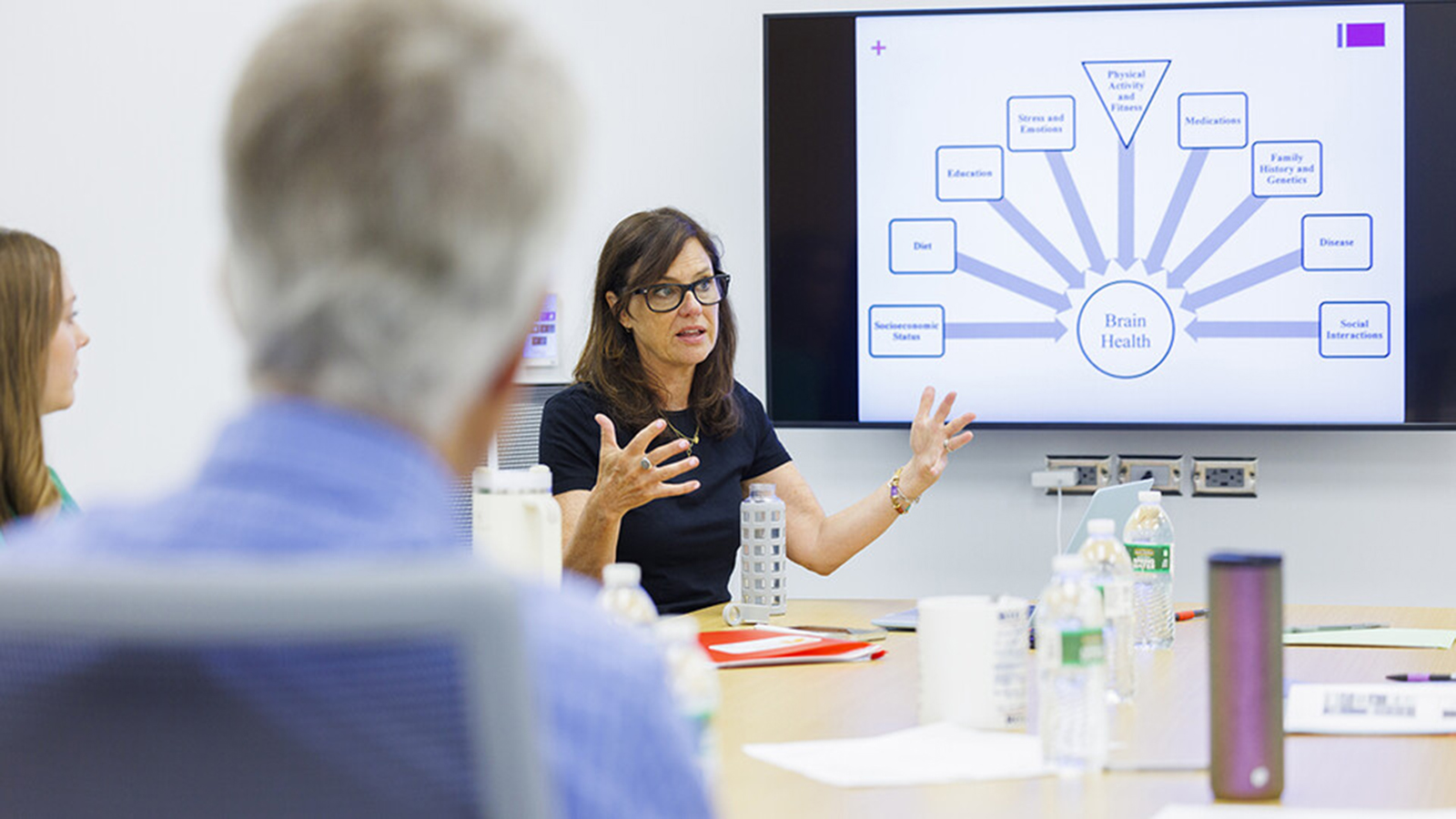
Brain health, memory are focus of Barkley Center workshop
08 Jul 2024 By Kristina Jackson, University Communication and Marketing
A workshop in the University of Nebraska–Lincoln’s Barkley Speech-Language and Hearing Clinic is helping people identify normal changes in memory, as well as strategies for maintaining good cognitive health with aging.
“Everything you see about diet, exercise, staying social and staying cognitively active, those are the magic bullets,” said Judy Harvey, coordinator of the memory workshop. “Being good to yourself and your body.”
The center holds the UNL-Tabitha Memory Workshop during spring, summer and fall sessions. Each session lasts eight weeks and covers topics that can contribute to cognitive health, including building routines and habits, diet and exercise. The Barkley Clinic partners with Tabitha Health Care to provide some of the lessons.
Harvey said the workshop is for anyone interested in learning about the subject, or family and friends of someone with an impairment, but it was initially targeted at people who might be experiencing mild cognitive impairment — or more memory loss than average but not as severe as dementia.
The workshop begins with identifying what typical memory changes with aging look like and what might be indicators of something more serious. It is natural to need more processing time or to hear things more often to retain new things, Harvey said.
“People think it’s normal to start being forgetful, and that’s not entirely true,” she said.
An average age-related memory mistake might be struggling to come up with a word or forgetting where one has placed keys or a remote. In contrast, it is not typical to make mistakes that one never would have before, like getting lost in one’s own neighborhood or otherwise doing things that might put oneself or others in danger. Even stress and worry can lead to more mistakes or forgetfulness that are not indicative of a major concern.
“If you feel like you are having some red flags, that can cause stress, and stress itself can cause signs of cognitive decline,” Harvey said. “Now all of a sudden you’re distracted by internal thoughts.”
The workshop walks participants through ways to learn new information, improve attention and organize things to capitalize on habits. Procedural memory, or memory developed through repetition of habits and routines, is resistant to decay, so Harvey said they try to teach participants to use it to their advantage.
“We live in a loud, noisy and distracting environment, so it is harder as you age to single task and to be able to focus on one thing rather than all the things going on around us,” she said. “But that’s different than being naturally forgetful.”
The workshop also includes visits from a physical therapist, who speaks about exercise habits, and a dietitian, who discusses how nutrition can contribute to cognitive health. The variety of topics gives participants options so they can figure out what might be the most helpful areas to look at in their own life, whether it’s a new exercise routine, getting better sleep or activities they can do to stay cognitively active.
“If you don’t love crossword puzzles, there’s no reason for you to start doing crossword puzzles,” Harvey said. “If you love baseball, though, watch baseball, get on a fantasy league, talk to people about baseball, make that more a cognitively stimulating activity.”
Kathy Brune registered for the workshop with her mother, who is 91, to gain some insight into helpful strategies. Brune said she was planning to incorporate more beneficial foods like fruits, vegetables and leafy greens into her diet because of some advice from one session.
“I was thinking I was doing it more for my mom, but as we go on I have thoroughly enjoyed it and have learned a lot,” she said.
Besides learning some tips, Brune has enjoyed speaking to other participants about their experiences. She said it’s been valuable to socialize with them about their concerns or strategies they are using.
“It’s nice knowing people are going through the same things you are and getting some different ideas of what they’re doing or what they’ve been through,” she said.
Harvey said people open up and make connections with the group over the course of the workshop. Someone who at first says they are just curious might eventually acknowledge concerns.
“What I see a lot is relief, like ‘Oh, you do that too?’” Harvey said. “We’ll say, let’s talk about that, why this type of mistake is made or what could be the reason for that.”
The feedback Harvey hears from participants indicates more confidence in memory and improved strategy use. An active social life helps with cognitive health, Harvey said, so the time with others is a step toward connection and learning from others. The workshop also covers some community resources to that end.
“It’s putting it into action,” Harvey said. “Each week, we say, ‘Go home and practice this strategy.’ It’s putting things into place so you’re better off.”
Harvey wants people to understand that while they might joke about “having a senior moment,” they shouldn’t stop working on their cognitive health.
“Sometimes there’s something you can do about it,” Harvey said. “Even if it is something where you have a diagnosis, there are things you can do to get the best quality of life.”
College of Education and Human Sciences
Special Education and Communication Disorders
Comprehensive Health & Well-Being